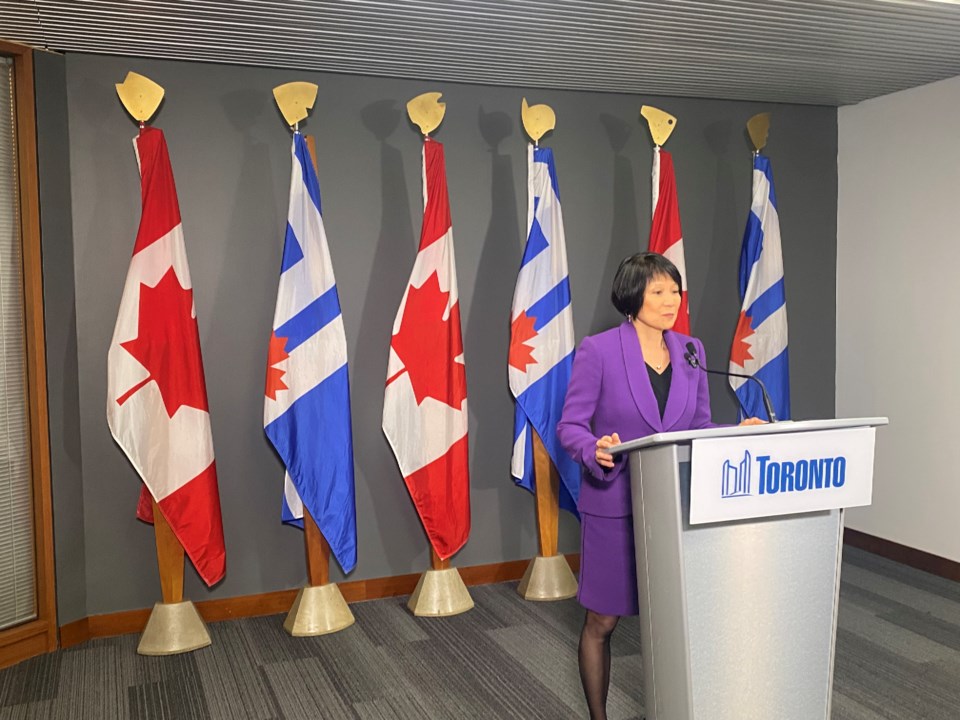Mayor Olivia Chow and city manager Paul Johnson struck what they called a “roundtable” to discuss a recent ombudsman report that said the city “unfairly” turned away refugees from the shelter system, forcing them to sleep on the street in 2022 and 2023.
Johnson said the roundtable will “discuss the events in this report” and that he looks forward to supporting the shelter system "to ensure we develop a system that can best support the unique needs of refugees and asylum seekers.”
A spokesperson for Toronto Ombudsman Kwame Addo told TorontoToday he has no comment because the office has “not received any details about a roundtable or any next steps.”
“There are lessons to be learned from that time period as we seek to continuously improve our response to homelessness and refugee arrivals,” Johnson said in a statement on Friday.
But one city councillor said Friday’s move comes up short.
“I don’t believe a closed door, behind the scenes … eleventh-hour reprieve trying to make nice and put a bandaid to the situation is the solution,” Scarborough Centre Coun. Michael Thompson said in an interview with TorontoToday.
“This matter should come back to council … It needs to be transparent,” he said.
Report makes waves at city hall
In November 2022, the city decided to stop allowing refugee claimants into the base shelter system, which is historically reserved for Toronto’s homeless population. The city usually operates separate shelters for refugee claimants, where they can access more specialized services.
“Triaging who receives shelter is a terrible decision, but this is a reality city staff encounter daily,” Johnson said on Friday.
In his Dec. 12 report, Addo said the move “amounted to anti-Black racism” and made 14 recommendations to city staff. In a response that same day, Johnson said he disagreed with the recommendations “for the simple reason that we do that already.”
Councillors were supposed to debate the report — including whether to force Johnson to implement the recommendations — on Wednesday.
Instead, Toronto Danforth Coun. Paula Fletcher moved to “receive” the report, preventing any further debate. It passed on a show of hands.
Toronto-St. Paul’s Coun. Josh Matlow tried to change his vote after but was ruled out of order.
I believe Council made a serious mistake yesterday by receiving the Ombudsman’s report on sheltering refugees. What happened was wrong. Although I did try to correct it later in the meeting, my request was sadly ruled out of order. People seeking refuge in our city should never..
— Josh Matlow (@JoshMatlow) December 19, 2024
Later in the day, Scarbrough Centre Coun. Michael Thompson, who wasn’t present for the initial vote, chastised his fellow councillors for allowing the report to pass without debate.
“It appears that this was part of a political game, and people's lives are at risk,” Thompson said in an interview on Friday.
Thompson said he hopes Chow will move to reopen debate at February’s city council meeting. If not, he’ll do it himself.
“I’m fully vested in this issue,” he said.
Refugees excluded from shelter system two years ago
The decision to exclude some refugees — largely from African countries — from the shelter system came in November 2022 but wasn’t announced publicly until May 2023.
When the federal government eased border restrictions post-pandemic, refugee claimants began accessing Toronto shelter beds at a higher rate than normal.
In 2016, an average of 459 refugee claimants used a shelter bed every night. In March 2022, that number had grown to 1,176. By August 2022, an average of 1,897 refugee claimants were using shelter beds nightly.
When the city went public with its decision to exclude claimants from shelters, it started referring them to the federal government — they said the decision was made because the system was overwhelmed, and Queen’s Park and Ottawa hadn’t stepped up with more funding for Toronto’s shelters.
That led to refugee claimants sleeping on the street. Some were resettled by largely Black-led churches and community groups.
Councillors passed a motion to reverse the exclusionary policy in July 2023. It was still in effect up until September 2023, but was officially scrapped following a Toronto Star article that reported refugees still sleeping on the street.
